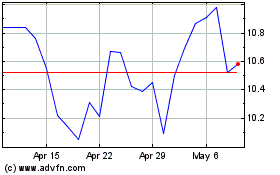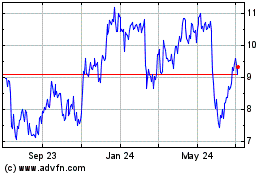By Joe Flint and Ben Fritz
As big entertainment companies join forces through megamergers
and technology giants invest billions of dollars in new
programming, Lions Gate Entertainment Corp. is finding it tough to
stick to its script.
The independent studio behind "The Hunger Games" and "Orange is
the New Black" embarked on a strategy to roll up other small and
midsize entertainment companies in 2015, after media mogul John
Malone bought a stake. The purchase of Starz, a pay-TV network, for
$4.4 billion was the first step. Lions Gate's growth plans have
since stalled. In 2017, talks to sell itself to toy maker Hasbro
Inc. fell through.
Investors have sent Lions Gate shares down 42% from a peak last
summer, concerned about the studio's viability compared with
industry giants such as Walt Disney Co. and Netflix Inc. Revenue in
2018's final quarter fell 20% from a year earlier to $933.2
million, and net income dropped nearly 90% to $22.9 million.
Morgan Stanley analyst Ben Swinburne recently lowered financial
projections for the company and said in a report he is taking a
"more cautious long-term view" of its assets.
Some Lions Gate employees said they have found it difficult at
times to engage in long-term planning because they didn't expect
the studio to last long as an independent entity. "It feels like
the company has gone into extra innings," said one former
executive. Meanwhile, the company has been beset by internal
conflicts tied to the integration of Starz, as well as uncertainty
in reorganizing its motion-picture business and challenges in
finding new TV hits.
Lions Gate Vice Chairman Michael Burns and Chief Executive Jon
Feltheimer said in an interview that they have continued long-term
planning as usual. They said the studio is a healthy independent
company able to sell content to other distributors, and also to
invest in Starz as one of several subscription services that will
prosper in the coming years. They declined to comment on deal
making.
Starz, whose hit shows include "Power" and "Outlander," has 25
million U.S. subscribers, compared with HBO's 36 million. The
company is pursuing growth by expanding the channel's modest
international presence.
"We're well-positioned as both an arms merchant and with our own
platform," said Mr. Feltheimer. "I think ultimately Wall Street
will see it that way."
Many of Lions Gate's problems have to do with Starz. The deal
created a clear opportunity for Lions Gate's television-production
studio to make shows for Starz, according to analysts and people
inside the company. Yet, the first such show, a supernatural
thriller called "The Rook," will premiere this summer, nearly three
years after the acquisition.
Chris Albrecht, who ran Starz until early this year, regularly
balked at attempts by Lions Gate to give him shows that he felt
didn't fit on the network, people close to the company said.
Messrs. Feltheimer and Burns at times expressed frustration that in
their view Mr. Albrecht wasn't a team player and didn't spend
enough time focused on day-to-day operations, these people said.
Mr. Albrecht, who led Starz before it was acquired, would complain
that Lions Gate's declining share price was costing him personally,
some of the people said.
"I think we had some different ideas about how to run
things...and a bit less cooperation than I wanted," Mr. Feltheimer
said.
In February, Mr. Albrecht resigned at the urging of Mr.
Feltheimer, according to people familiar with the matter. Now, the
two companies are "working really closely," Mr. Feltheimer
said.
"I think it is fair to say I saw the next phase of evolution of
the company being more Starz-centric while being laser focused
about restoring and creating value for our shareholders," Mr.
Albrecht said in a statement.
Despite the friction, Starz has performed well financially, with
revenue increasing 4% to $366.8 million and profits up nearly 10%
to $134.1 million in the fiscal third quarter ended Dec. 31. It
added just over one million subscribers in 2018.
Competition from coming video services from Disney, AT&T
Inc.'s WarnerMedia and Apple Inc. could threaten Starz's growth.
Mr. Burns said technology companies also offer opportunities,
noting that Apple will be selling Starz subscriptions on its TV
service.
Lions Gate's movie business, meanwhile, has lost ground since
"The Hunger Games" series ended in 2015. Its attempts to create or
revive major film franchises have fizzled, including "Divergent,"
"Gods of Egypt," "Robin Hood" and this month's "Hellboy." The lone
exception has been the "John Wick" action movies, starring Keanu
Reeves. Also, filmmaker Tyler Perry recently released what he said
would be the final film in his successful "Madea" series, which
have been major moneymakers for Lions Gate.
Many of the company's top motion-picture executives have left in
the past 18 month, and new production starts have slowed. As a
result, Lions Gate is relying more on movies it acquires or
releases for partners. The company has recently finished assembling
a new senior team and is ramping production back up. Typically,
studios make more money from movies they produce themselves than
those they acquire from third parties.
Lions Gate faces a major challenge called "Chaos Walking." The
first of several planned adaptations of a series of young-adult
science fiction novels cost around $100 million to produce but
turned out so poorly it was deemed unreleasable by executives who
watched initial cuts last year, according to current and former
employees.
Lions Gate delayed the film's planned March release and is about
to begin three weeks of additional production, at a cost of
millions more, in the hope that new scenes will improve its
commercial prospects.
"We wouldn't be shooting more if we didn't think we could make
this movie work," said Mr. Feltheimer.
--Shalini Ramachandran contributed to this article.
Write to Joe Flint at joe.flint@wsj.com and Ben Fritz at
ben.fritz@wsj.com
(END) Dow Jones Newswires
April 21, 2019 11:14 ET (15:14 GMT)
Copyright (c) 2019 Dow Jones & Company, Inc.
Lions Gate Entertainment (NYSE:LGF.A)
Historical Stock Chart
From Mar 2024 to Apr 2024

Lions Gate Entertainment (NYSE:LGF.A)
Historical Stock Chart
From Apr 2023 to Apr 2024
